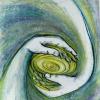 Submitted by Rev. Micah Allard on
Submitted by Rev. Micah Allard on

P1) Hope is a virtue.
P2) If God does not exist, hope is not a virtue.
C) God exists.
Defense of P1: Hope is a habit of the will by which one desires a good and expects to receive it. As in many virtues, hope is a mean between extremes, as one can desire a good in a disordered way (too much or too little in relation to other things, good or bad), and ones expectations can be too high or too low for evidential reasons. Hope, then, involves achieving a mean in both what one desires and what one expects, which shows that there is a certain state of character that admits of a mean between extremes that tends towards our good. There are goods that we can appropriately desire, and which we can reasonably expect to obtain. So hope is a virtue.
Defense of P2: Schopenhauer is right, and Nietzsche is wrong. If there is no God, there is no external, objective, and ultimate source of meaning, i.e. there is no global meaning and any local attempts at meaning is futile. Pessimism is the appropriate expectation, and hope is, therefore, a vicious extreme. Likewise, no good is all that good in the long run, so one should not desire any good more than non-existence, which the anti-natalist philosopher, David Benatar, notes is at least “not-bad”. The “not-badness” of non-existence outweighs the minor goods found in existence when they are stacked along side the immense amount of suffering and misery life doles out. Therefore, even if there is a minor good that one might reasonably expect, hope is still vicious because, on the whole, one is desiring a good disproportionately, when one should favor the blessings of non-existence, once one has truly weighed out everything. As Schopenhauer writes:
Again, you may look upon life as an unprofitable episode, disturbing the blessed calm of non-existence. And, in any case, even though things have gone with you tolerably well, the longer you live the more clearly you will feel that life is a disappointment, nay, a cheat…” (On the Sufferings of the World, 1851).
What about Nietzsche and Russell? Both admit that with atheism, there is no ultimate sort of meaning. But Nietzsche resists the pessimistic implication by supposing that we can invent meaning from within. Can this be done while also recognizing that this meaning is subjectively invented? Can one fall for an illusion while also noting that it is an illusion? Russell writes:
…[A]lthough it is of course gloomy view to suppose that life will die out—at least I suppose we may say so, although sometimes when I contemplate the things that people do with their lives I think it is almost a consolation—it is not such as to render life miserable (Why I am not A Christian, 1927).
Almost a consolation? We can be a “Pollyanna” and turn our attention to local goals, but in the end, we know that these goods and ultimate justifications cannot make hope, the expectation and desire of goods, a mean between extremes. Virtuous hope, in a godless world, is impossible because it would be based the illusory belief that our invented meaning is better than it really is, or that, in the long run, the illusion that we can reasonable to expect such goods for any decent amount of time into our brief and decrepit future. Hope, in a godless world, becomes the vice of presumption, where desires and expectations are not aligned with the reality of the situation.
But then again, hope really is a virtue, so given the validity of the argument, God exists.
https://vexingquestions.wordpress.com/2019/05/23/an-argument-from-hope/